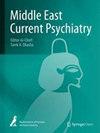Early post-COVID-19 common psychiatric complications: role of basic inflammatory, coagulation, and clinical risk factors
IF 1.6
Q3 PSYCHIATRY
引用次数: 0
Abstract
The infection caused by the SARS-CoV-2 virus has led to the emergence of a novel diagnostic entity known as “post-COVID syndrome” (PCS). It is characterized by a constellation of medical and psychiatric symptoms that occur and persist for variable duration following the COVID infection. Among these post-COVID psychiatric symptoms are depressive and anxiety disorders, which were found to be the highest prevalence in the post-COVID period. The frequency and severity of post-COVID symptoms are correlated with the severity of the infection. Many inflammatory and coagulation markers have been involved in the severity of post-COVID symptoms and hence the development of post-COVID psychiatric symptoms/disorders. Limited research has been conducted to examine the psychological challenges experienced by individuals in the early stages of post-COVID recovery in Egypt, specifically within a timeframe of 1 to 3 months. The current study aims to estimate the occurrence rate of early post-COVID psychiatric symptoms/disorders such as depression and anxiety and to detect its association with clinical and severity parameters of COVID-19 infection. The current study was a comparative cross-sectional approach, from the chest department’s “post-COVID-19 follow-up” outpatient clinic at Kobri ElKoba Medical Complex in Cairo, Egypt. A convenient sample of adult Egyptian patients were recruited between October 2021 and June 2022. They were subjected to the following: a pre-designed questionnaire to collect the patients’ demographic characteristics, Arabic version of General Health Questionnaire (GHQ) to identify potential cases, Arabic version of Structured Clinical Interview for DSM-IV (SCID I) Clinician Version (SCID-CV) and retrieval of essential related clinical and laboratory data like C-reactive protein (CRP), systemic immune-inflammation index (SII): (neutrophils × platelets)/lymphocytes), neutrophil/lymphocyte ratio (NLR) and platelet/lymphocyte ratio (PLR), and D-dimer and COVID-19 treatment lines together with a liker scale questionnaire to assess the severity of COVID-19 infection. Depression was found to be the most prevalent psychiatric disorder (45.6%) among the study participants, followed by generalized anxiety disorder (42.1%). Subthreshold GAD and depression were found in 17.5% and 14% of patients respectively. COVID was a major predictor of GAD (p 0.000), while being on antibiotics (p = 0.033), having cardiac illnesses (p = 0.007), and an increased D dimer (p = 0.022) were the most predictive factors for depression. COVID-19 infection has demonstrated an increased risk of mental health problems in multiple domains. It was evident that depression was the most presenting psychiatric illness among the studied sample (45.6%), while generalized anxiety disorder was the second most prevalent disorder (42.1%). And suicide was found in 9.6% of the study sample. It is worth noting that our results displayed a high prevalence of subthreshold psychiatric symptoms. These findings emphasize the utmost need for mental health assessments for all survivors.COVID-19 后早期常见精神并发症:基本炎症、凝血和临床风险因素的作用
由 SARS-CoV-2 病毒引起的感染导致出现了一种新的诊断实体,即 "后 COVID 综合征"(PCS)。它的特点是在感染 COVID 后出现一系列医学和精神症状,且持续时间长短不一。在这些后 COVID 精神症状中,抑郁和焦虑症是后 COVID 期间发病率最高的。COVID 后症状的频率和严重程度与感染的严重程度相关。许多炎症和凝血标志物与感染后症状的严重程度有关,因此也与感染后精神症状/失调的发展有关。在埃及,对感染后初期(特别是 1 至 3 个月内)患者所经历的心理挑战进行的研究十分有限。本研究旨在估计 COVID 后早期精神症状/障碍(如抑郁和焦虑)的发生率,并检测其与 COVID-19 感染的临床和严重程度参数之间的关联。本研究采用横断面比较法,在埃及开罗 Kobri ElKoba 医疗中心胸科 "COVID-19 后随访 "门诊进行。在 2021 年 10 月至 2022 年 6 月期间,对埃及成年患者进行了抽样调查。他们接受了以下调查:预先设计的调查问卷以收集患者的人口统计学特征、阿拉伯语版的一般健康问卷(GHQ)以确定潜在病例、阿拉伯语版的 DSM-IV 结构化临床访谈(SCID I)临床医生版(SCID-CV),以及检索相关的基本临床和实验室数据,如 C 反应蛋白(CRP)、全身免疫炎症指数(SII):(中性粒细胞×血小板)/淋巴细胞)、中性粒细胞/淋巴细胞比值(NLR)和血小板/淋巴细胞比值(PLR)、D-二聚体和COVID-19治疗线等相关临床和实验室基本数据,并使用Liker量表问卷评估COVID-19感染的严重程度。研究发现,抑郁症是研究参与者中最常见的精神疾病(45.6%),其次是广泛性焦虑症(42.1%)。17.5%的患者患有阈下焦虑症,14%的患者患有抑郁症。COVID 是预测 GAD 的主要因素(p 0.000),而服用抗生素(p = 0.033)、患有心脏病(p = 0.007)和 D 二聚体增加(p = 0.022)则是预测抑郁的最主要因素。COVID-19 感染表明,在多个领域出现心理健康问题的风险增加。很明显,抑郁症是研究样本中最常见的精神疾病(45.6%),而广泛性焦虑症是第二大常见疾病(42.1%)。在研究样本中,9.6%的人有自杀倾向。值得注意的是,我们的研究结果显示,阈值以下精神症状的发病率很高。这些发现强调了对所有幸存者进行心理健康评估的极端必要性。
本文章由计算机程序翻译,如有差异,请以英文原文为准。
求助全文
约1分钟内获得全文
求助全文
来源期刊

Middle East Current Psychiatry
Medicine-Psychiatry and Mental Health
CiteScore
3.00
自引率
0.00%
发文量
89
审稿时长
9 weeks
 求助内容:
求助内容: 应助结果提醒方式:
应助结果提醒方式:


